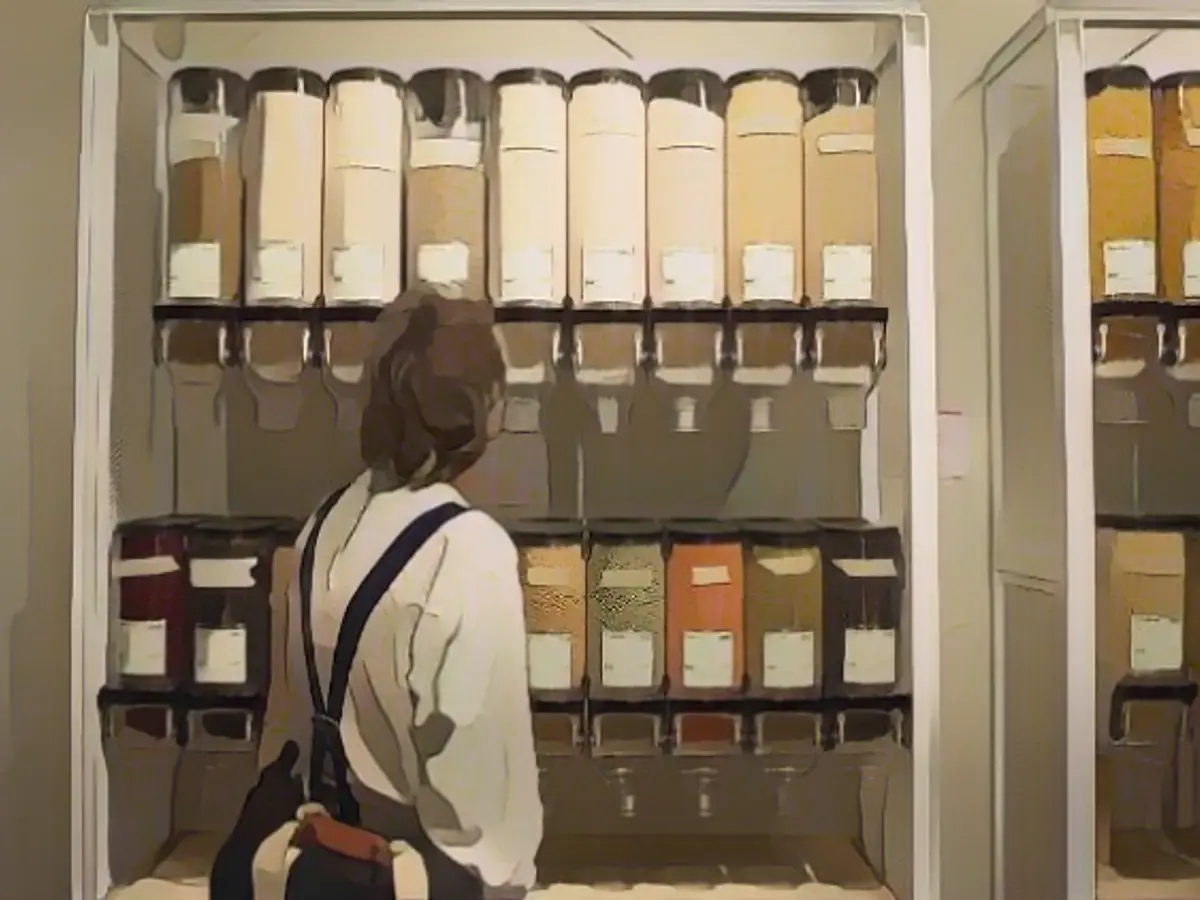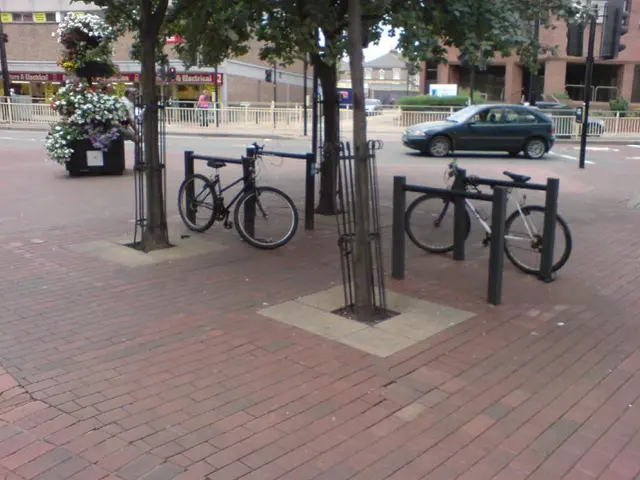Going green and ditching plastic - why it's worth it after all
When it comes to taking care of our environment, Katharina Richter, managing director of Berlin's Original Unverpackt store, shares a passion similar to Eckart von Hirschhausen: considering our planet as our living room and keeping it clean. Despite facing some challenges in the past, the waste-free supermarket managed to turn things around and continue its mission. In an exclusive interview with ntv.de, Richter shares why it's still worth making the switch to a sustainable lifestyle and zero-waste shopping, even in today's challenging times.
ntv.de: After some locations failed in Germany, why are you still advocating for waste-free living and Original Unverpackt?
Katharina Richter: The concept of Original Unverpackt itself didn't fail. Several stores faced financial difficulties due to various reasons, such as credit burdens and projects that were not pursued. Original Unverpackt needed to shrink in size to operate more sustainably, which led to cutting down on staff from 30 employees to just 10.
ntv.de: Is the enthusiasm for the zero-waste movement waning with only 12,000 euros raised through the rescue campaign compared to the 100,000 euros raised in 2014?
Richter: Last year's rescue campaign was primarily aimed at securing pre-financing for the goods for one or two months, and the existing store was already in operation. A higher amount wasn't necessary because the main objective was to generate reach and create awareness about the ongoing operations.
ntv.de: How can the store still generate income and revenue during the current crisis?
Richter: We're focusing on our loyal regular customers and want to establish ourselves more in the neighborhood. We use Instagram and other social media channels for marketing, as well as send out newsletters. Our primary goal is to improve processes and establish a financial buffer, rather than focusing on growth.
ntv.de: Are there any other funding sources besides crowdfunding?
Richter: Unfortunately, we don't fit into any existing funding categories according to the Berlin Senate. They consider us a profit-oriented supermarket, but we're so much more than that. Original Unverpackt is a source of inspiration and a meeting place, offering space for education and sustainable development. We promote environmental education in daycare centers and conduct regular guided tours of our facilities. This is where politics is lagging behind; there's a need for a suitable form of business for companies that operate for the betterment of society.
ntv.de: How has the pandemic, war, and inflation impacted the store's operations and customer base?
Richter: The food retail sector has primarily been affected by these crises. Our store and the organic trade are hit hardest because we're less financially strong than discounters. Nevertheless, our sales are sufficient to allow for the development of additional projects, such as the expansion to a second store that saved from closure due to an owner's relocation.
ntv.de: What are some ways the store is making waste reduction work in practice?
Richter: We minimize packaging by purchasing bulk goods and using reusable containers. Spaghetti comes in a 5 kg bag, saving 58% of primary packaging and 100% of secondary packaging compared to the 500-g pack in conventional supermarkets. We also accept used glass and old parcel packaging in exchange for a deposit, saving us costs. This waste reduction strategy helped Original Unverpackt avoid over 500 kilos of plastic, almost 3 tons of cardboard, and over 12,000 tons of used glass in just one year.
ntv.de: Is it worth visiting an unpackaged store instead of shopping in supermarkets with minimal packaging?
Richter: Although supermarkets are gradually adopting waste reduction strategies, an unpackaged store still offers unique advantages, such as a larger emphasis on organic products. Although competition stimulates the industry, supporting shops like Original Unverpackt ensures prosperity and preserves good living conditions for future generations.
ntv.de: How does the store stay motivated amidst the ongoing crisis?
Richter: My motivation comes from fighting to provide a livelihood for my son. I realize the importance of what we're doing and hope to leave the planet in better condition for future generations.
ntv.de: Is there any contingency plan if the store faces insolvency again?
Richter: I always closely monitor the company's liquidity to recognize potential capital shortages early. If needed, options like personal loans, bank loans, or crowdfunding can be explored.
ntv.de: What are the key benefits of waste-free living and zero-waste shopping for the individual and the environment?
By transitioning to zero-waste living, individuals can contribute to a healthier planet, reduce pollution, conserve natural resources, mitigate climate change, and improve public health. Achieving this involves properly managing waste, recycling, and adopting circular economy principles. Moreover, waste-free practices foster a sense of community, promote resource recovery, and lead to energy efficiency[1][2][4].
With Katharina Richter leading the way, Original Unverpackt continues to advocate for an eco-friendly lifestyle and encourages consumers to embrace sustainable, waste-free practices. By shopping at waste-free stores like Original Unverpackt, individuals can make a significant impact on the environment and support a movement for positive change.
Leah Nowak spoke to Katharina Richter
Additional Enrichment Information:
1. Reduced Pollution: Proper waste management can avoid the release of harmful pollutants into the environment. This reduces contamination in natural habitats such as forests, rivers, and oceans [2].
2. Conservation of Natural Resources: Waste reduction practices like recycling and composting help conserve resources such as forests and metals, since less raw material needs to be sourced [2].
3. Mitigation of Climate Change: - Proper waste management mitigates climate change by lowering greenhouse gas emissions associated with decomposition and energy production from waste. - Zero-waste living reduces the waste sent to landfills, lowering methane emissions and sequestering carbon dioxide through composting [2][4].
4. Improved Public Health: Clean, waste-free environments have a positive impact on public health by reducing the spread of diseases and promoting well-being. Proper waste disposal practices help prevent contamination, which can lead to various health issues [2].
5. Emission Reduction and Energy Savings: Being mindful of energy consumption through eco-friendly habits like taking shorter showers and using energy-efficient appliances can help reduce greenhouse gas emissions and save energy, contributing to a healthier planet [1].
6. Support of Sustainable Living: Zero-waste initiatives encourage communities to live more sustainably. This includes fostering a sense of community while promoting resource recovery through local buy nothing or freecycle groups, as well as composting practices [2][4].
7. Cost-Savings and Resource Preservation: Practices like sharing items through community exchanges and reusing household items can lead to cost savings while preserving resources. Additionally, proper waste management and composting can reduce waste disposal costs [2].
8. Societal Awareness and Involvement: Zero-waste initiatives provide opportunities for societal involvement and awareness, inspiring communities to participate and adopt sustainable living practices [1].
[1] National Geographic: How to reduce your food waste [] [2] Earth Science, National Geographic Society (2021). [] [3] EPA: Benefits of recycling [] [4] EPA: Composting []








